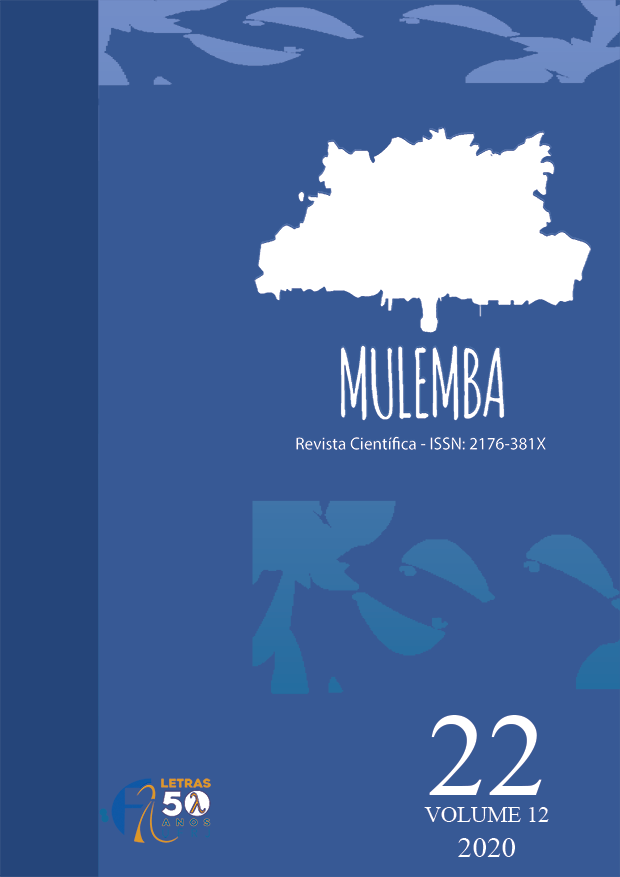Quem constrói o “cânone internacional” das Literaturas Africanas em Português? Tradução, instituições e assimetrias norte/sul
DOI:
https://doi.org/10.35520/mulemba.2020.v12n22a39812Keywords:
tradução, instituições, mundialização, literatura-mundo, sistema literário mundialAbstract
Este artigo visa apresentar alguns dados sobre a dimensão e a estrutura da tradução de obras de literatura africana do português para as principais línguas europeias, para depois problematizar estes resultados à luz de algumas ferramentas teóricas: o conceito-chave de literatura-mundo, assim como enquadrado, por um lado, pelo Warwick Research Collective (Combined and Uneven Development) e, por outro, por Pascale Casanova na República Mundial das Letras. Recolhendo também a herança do Cultural Turn dos Estudos de Tradução (André Lefevere e Lawrence Venuti), vemos como a troca literária a partir da África de língua portuguesa segue linhas determinadas por uma reescrita promovida em boa medida por agências baseadas em Portugal. O que nos leva ao discurso das instituições que estabelecem os cânones literários, tal como enquadradas por Stefan Helgesson e Pieter Vermeulen em Institutions of World-Literature e pelo trabalho de Claire Ducournau sobre a instituição das literaturas africanas em francês, do qual este artigo é devedor e que, aplicado ao nosso corpus, questiona o papel relativo de África e de Portugal na consagração e mundialização destas literaturas. As primeiras conclusões apontam para uma visão global das literaturas africanas de língua portuguesa como criação mais do Norte Global – e especialmente do centro lisboeta – do que propriamente africana, na sua institucionalização.
References
BUCAIONI, Marco. Le letterature dell’Africa lusofona. Panoramica storico-culturale e critico-letteraria, Perugia, Urogallo, 2015.
CASANOVA, Pascale. La république mondiale des lettres. Paris: Seuil, 1999.
CHABAL, Patrick (org.). The Postcolonial Literature of Lusophone Africa. London: Hurst & co, 1996.
DAMROSCH, David (org.). World Literature in Theory. Malden and Oxford: Wiley-Blackwell, 2014.
DECKARD, Sharae; LAWRENCE, Nicholas. Combined and Uneven Development. Towards a New Theory of World-Literature. Liverpool:University Press, 2015.
DUCOURNAU, Claire. La Fabrique des classiques africains. Écrivains d’Afrique subsaharienne francophone (1960-2012). Paris: CNRS, 2017.
HEILBRON, Johan. “Structure and Dynamics of the World System of Translation”. International Symposium Translation and Cultural Mediation, UNESCO H.Q., February 22-23, 2010.
HELGESSON, Stefan; VERMEULEN, Pieter (orgs.). Institutions of World Literature: Writing, Translation, Markets. New York: Routledge, 2016.
LARANJEIRA, José Luís Pires. Literaturas Africanas de Expressão Portuguesa. Lisboa: Univerisdade Aberta, 1995.
LEFEVERE, André. Translation, Rewriting, and the Manipulation of Literary Fame. London and New York: Routledge, 1992.
LEITE, Ana Mafalda. Literaturas Africanas e Formulações Pós-Coloniais. Lisboa: Edições Colibri, 2003.
PADILHA, Laura Cavalcante (org.). Lendo Angola. Porto: Afrontamento, 2008.
RIBEIRO, Margarida Calafate (org.). Literaturas da Guiné-Bissau. Cantando os escritos da história. Porto: Afrontamento, 2011a.
RIBEIRO, Margarida Calafate (org.). Literaturas Insulares. Porto: Afrontamento, 2011b.
RIBEIRO, Margarida Calafate; MENESES, Maria Paula (orgs.). Moçambique - das palavras escritas. Porto: Afrontamento, 2008.
SALINAS PORTUGAL, Francisco. Literaturas africanas en lengua portuguesa. Madrid: Sintesis, 2006.
TAVARES, Ana Paula (org.). 50 anos: Luís Bernardo Hownana, nós matámos o cão-tinhoso: jornada comemorativa. Lisboa, Fundação Gulbenkian/Theya, 2016.
TOPA, Francisco (org.). LUUANDA HÁ 50 ANOS. Críticas, prémios, protestos e silenciamento. Porto: Sombra pela Cintura, 2015.
VENUTI, Lawrence. The Scandals of Translation. Towards an Ethic of Difference, London and New York: Routledge, 1998.
VENUTI, Lawrence. The Translator’s Invisibility. London and New York: Routledge, 1995.
WA THIONG’O, Ngũgĩ. Decolonising the Mind. The Politics of Language in African Literature. Portsmouth: Heinemann Educational, 1986.
Downloads
Published
Issue
Section
License
Authors who publish with this journal agree to the following terms:
- Authors retain copyright and grant the journal right of first publication with the work simultaneously licensed under a Creative Commons Attribution License that allows others to share the work with an acknowledgement of the work's authorship and initial publication in this journal.
- Authors are able to enter into separate, additional contractual arrangements for the non-exclusive distribution of the journal's published version of the work (e.g., post it to an institutional repository or publish it in a book), with an acknowledgement of its initial publication in this journal.
- Authors are permitted and encouraged to post their work online (e.g., in institutional repositories or on their website) prior to and during the submission process, as it can lead to productive exchanges, as well as earlier and greater citation of published work (See The Effect of Open Access).

